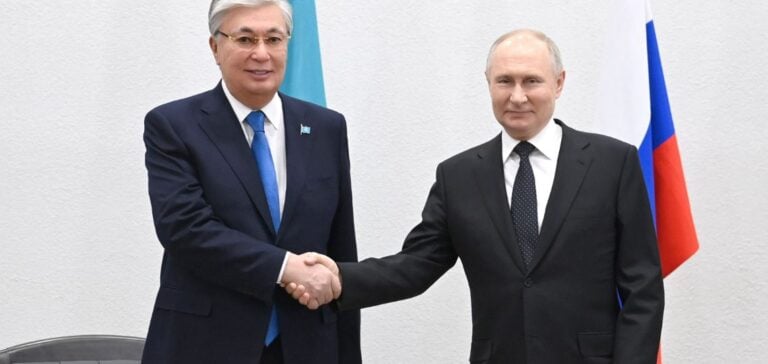Russian President Vladimir Putin is visiting Kazakhstan this Wednesday, a Central Asian country seen as a key strategic partner for Russia. This visit takes place against the backdrop of growing international tensions and diplomatic balancing, as Astana, the Kazakh capital, is courted by Beijing and Western powers.
Vladimir Putin described the Russia-Kazakhstan relationship as an “alliance tested by life,” highlighting the strength of historical and strategic ties between the two nations. Kassym-Jomart Tokayev, the Kazakh president, emphasized the role of privileged neighborhood with Russia while affirming Kazakhstan’s support for Ukraine’s territorial integrity without explicitly condemning the Russian invasion.
Energy issues at the heart of discussions
The focal point of this meeting includes strategic energy projects. Russia, through its nuclear giant Rosatom, aims to construct Kazakhstan’s first nuclear power plant. Although Rosatom is considered a key player, competition remains fierce, with bids from China, South Korea, and France.
Kazakhstan, which produces nearly 43% of the world’s uranium, faces a growing energy deficit. Establishing a nuclear plant aims to address this critical situation while strengthening bilateral cooperation in the sector.
Challenges in oil and gas
In the energy sector, discussions also cover the oil and gas industries. Kazakhstan, although dependent on Russia to export 80% of its oil, is actively seeking to diversify its export routes. Developing routes through the Caspian Sea exemplifies this strategy, designed to reduce dependence that exposes the country to international pressures.
In parallel, Vladimir Putin underscored the importance of “cooperation in the oil and gas sector” between the two nations, a field where joint projects could ease tensions caused by Western sanctions targeting Moscow.
An alliance in transition
While Kazakhstan and Russia share more than 7,500 kilometers of border, this geographical proximity does not prevent Astana from maintaining a nuanced foreign policy. Kazakhstan is regularly accused by Western countries of failing to comply with economic sanctions imposed on Moscow, accusations denied by the Kazakh government.
This visit comes at a time when regional security concerns are intensifying. President Tokayev recently strengthened Kazakhstan’s territorial defense while reiterating his wish for a “friendly neighborhood” with Russia.
At the conclusion of his visit, Vladimir Putin will participate on Thursday in a summit of the Collective Security Treaty Organization (CSTO), a military alliance of several former Soviet republics, to consolidate security and strategic ties in the region.






















